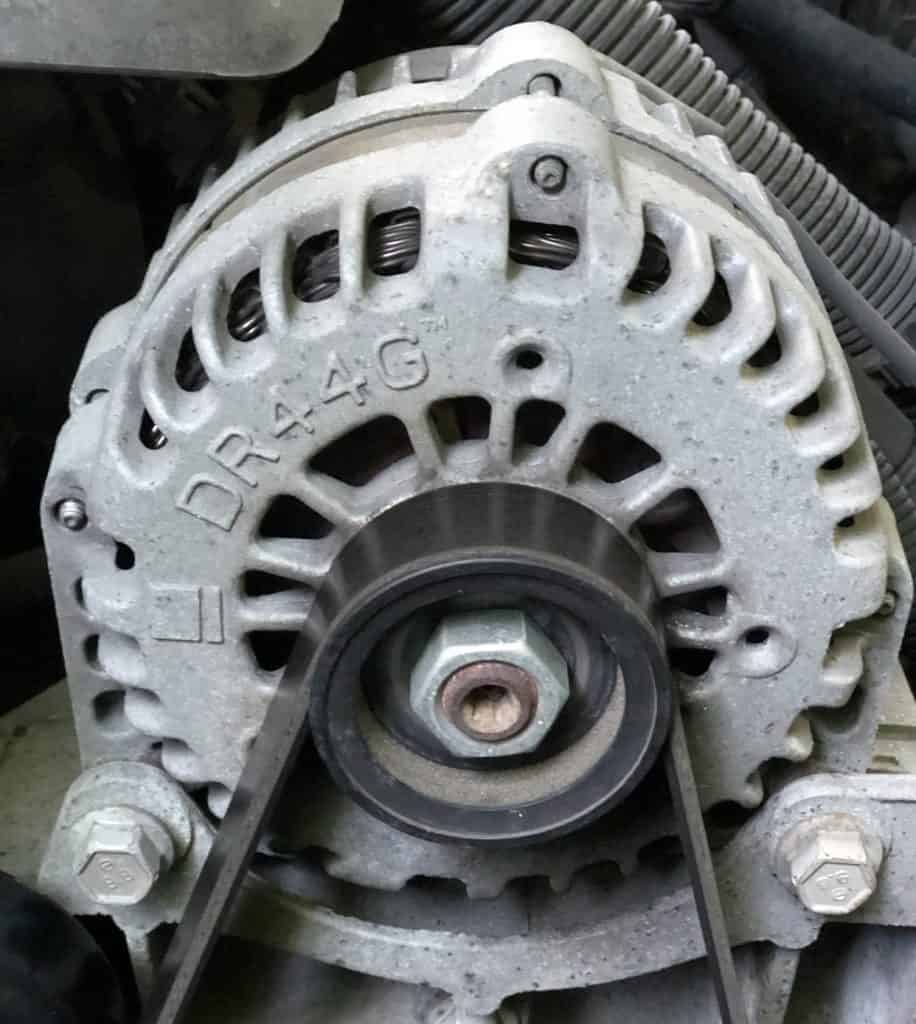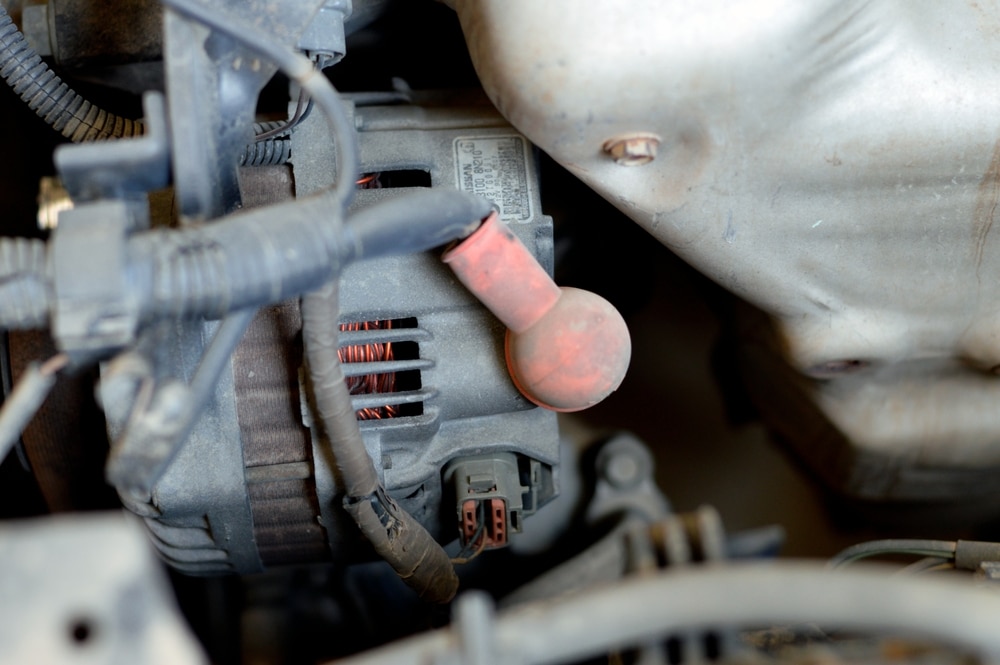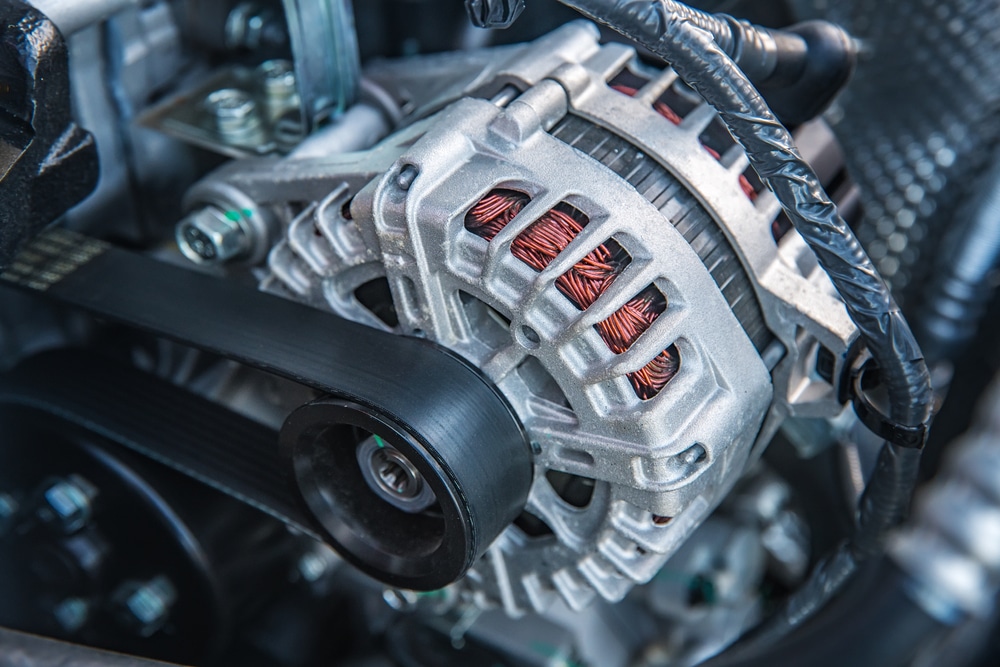Your car’s alternator is a crucial component that keeps your vehicle’s electrical system humming along.
Alternators typically last between 6-10 years or 80,000-150,000 miles, depending on various factors like driving conditions and vehicle maintenance.
This small but mighty piece of machinery works tirelessly to power your car’s electrical components and keep your battery charged.

Ever wondered why your headlights start to flicker or your dashboard lights dim unexpectedly? It might be your alternator signaling for help.
Recognizing these early warning signs can save you from being stranded on the side of the road with a dead battery.
Regular maintenance and proper care can help extend your alternator’s lifespan, ensuring your car stays powered up for years to come.
While alternators are built to last, they’re not immortal.
Factors like extreme temperatures, frequent short trips, and heavy electrical loads can shorten their lifespan.
Keeping an eye (and ear) out for telltale signs of alternator wear can help you catch problems early and avoid costly breakdowns.
Key Takeaways
- Alternators typically last 6-10 years or 80,000-150,000 miles with proper maintenance
- Warning signs like dimming lights or strange noises can indicate alternator problems
- Regular check-ups and avoiding excessive electrical loads can extend your alternator’s life
Understanding Your Alternator’s Role in the Electrical Symphony

Your car’s alternator is the unsung hero of its electrical system. It keeps your battery charged and powers all those gadgets you love while you’re cruising down the road.
The Heart of the Matter: What an Alternator Does
Think of your alternator as the powerhouse of your vehicle’s electrical system.
It’s like a tiny power plant under your hood, constantly churning out electricity.
Your alternator takes mechanical energy from the engine and turns it into electrical energy.
It’s a bit like a hamster wheel, but instead of a furry friend, you’ve got a rotor spinning inside a stator.
As you drive, the alternator keeps your battery topped up. It also powers all those fancy electrical gizmos you can’t live without – your radio, headlights, and that all-important phone charger.
Without a properly functioning alternator, you’d be driving a very expensive paperweight. Your battery would eventually die, leaving you stranded and probably late for dinner.
Alternating Current vs. Direct Current: The AC/DC Conundrum

Now, let’s get a bit technical, but don’t worry – we’ll keep it fun.
Your alternator produces alternating current (AC), but your car’s electrical system runs on direct current (DC). It’s like trying to fit a square peg in a round hole.
That’s where the rectifier comes in. It’s like a translator for your car’s electrical system, converting AC to DC.
Without it, your car would be as confused as a cat in a dog show.
The alternator’s output is carefully regulated to keep your electrical components happy. Too much juice, and you’ll fry your gadgets. Too little, and you’re back to that paperweight scenario.
Remember, your alternator is working hard every time you start your car.
It’s the roadie of your vehicle’s rock concert, making sure everything’s powered up and ready to go.
The Autopsy of an Alternator: Signs of Impending Doom
Your alternator is sending out distress signals, but are you tuned in to hear them? Let’s explore the telltale signs that your car’s electrical powerhouse is on its last legs.
The Tell-Tale Heart: Warning Lights and Dimming Headlights
You’re cruising down the road when suddenly your dashboard lights up like a Christmas tree.
That pesky battery warning light might actually be tattling on your alternator. Don’t ignore it!
Your headlights start to dim, and you feel like you’re driving through a perpetual fog. This isn’t a supernatural event; it’s your alternator waving a white flag.
As it struggles to keep up with your car’s electrical demands, your lights will fade faster than your hopes of avoiding a repair bill.
Keep an eye on your battery, too. If it’s constantly dying, your alternator might be the true culprit.
It’s like blaming the messenger when the real problem is the message sender.
Sound the Alarm: Strange Noises and Electrical Quirks
Your car suddenly sounds like it’s auditioning for a horror movie soundtrack.
That grinding or whining noise? It’s your alternator’s cry for help. Don’t turn up the radio to drown it out; your wallet will thank you later.
Ever notice your power windows moving slower than a sloth on vacation? Or your radio deciding to take random breaks?
These electrical quirks are your alternator’s way of saying, “I’m tired, boss!”
Remember, your alternator is like the heart of your car’s electrical system. When it starts to fail, everything else feels the strain.
So, if your car’s gadgets start acting up, it might be time to give your alternator a checkup.
Maintaining the Beat: Prolonging Your Alternator’s Lifespan
Want to keep your alternator crooning for years to come? It’s all about giving it some TLC and watching how you drive.
Let’s tune up your knowledge on keeping that electrical maestro humming along.
Tuning Your Ride: Routine Inspections and Maintenance
Start by giving your alternator a regular once-over.
Pop the hood and take a peek – is the belt looking worn or cracked? That’s your cue for a replacement.
Keep an ear out for any unusual sounds, like a grinding noise that might mean bearing trouble.
Don’t forget about your battery buddy! A well-maintained battery takes stress off the alternator.
Check those terminals for corrosion and keep them clean. It’s like flossing, but for your car’s electrical system.
Got a multimeter? Use it to check your alternator’s output voltage.
You’re looking for around 13.5 to 14.5 volts. If it’s off-key, it might be time for a chat with your mechanic.
Hit the Right Notes: Driving Conditions and Accessory Use
Your driving style can make or break your alternator’s career.
Short trips are like forcing a singer to perform without warming up – not ideal. Try to mix in some longer drives to keep everything charged up nicely.
Heavy traffic? It’s tough on your alternator. All that idling means it’s working overtime.
If you’re stuck in a jam, consider turning off power-hungry accessories.
Your heated seats might feel nice, but they’re making your alternator sweat.
Speaking of accessories, use them wisely.
Power windows, mirrors, and that bangin’ sound system all draw juice.
They’re fine in moderation, but constant use can wear your alternator down faster than a one-hit wonder.
Replacing Your Alternator: When the Music Stops
When your car’s alternator starts to fail, it’s like the DJ at a party running out of tunes.
You’ll need to act fast to keep the good times rolling. Let’s look at how to spot the signs and pick the perfect replacement.
Conducting the Swap: Signs It’s Time to Replace
Is your car giving you the silent treatment? A bad alternator can be a real party pooper.
Watch out for dimming headlights – they’re like your car’s way of yawning.
Hear any weird noises? If your engine sounds like it’s trying to beatbox, it might be the alternator pulley throwing a fit.
And that burning smell? It’s not your mixtape – it could be your alternator overheating.
Battery light glowing like a disco ball? That’s your car’s way of saying “SOS!” Don’t ignore these signs, or you might find yourself stranded faster than you can say “encore.”
Finding the Rhythm: Choosing the Right Alternator
Picking a new alternator is like choosing the perfect playlist. You want one that’ll keep your car grooving for miles.
First, check your vehicle’s specs – not all alternators are created equal.
Consider the amperage – it’s like the bass in your music.
More power-hungry add-ons? You might need to crank it up a notch.
And don’t forget about the serpentine belt – it’s the rhythm section of your engine bay.
Quality matters, folks.
A cheap alternator might seem tempting, but it could leave you singing the blues sooner than you’d like.
Aim for one that’ll last the typical 7-year lifespan. Your wallet will thank you in the long run.
Charging Forward: The Role of Voltage Regulators and Belts
You might think your alternator is the lone wolf of the charging system, but it’s got some trusty sidekicks.
Let’s talk about the unsung heroes: voltage regulators and belts.
The voltage regulator is like your alternator’s personal bouncer.
It keeps the voltage output in check, making sure your car’s electrical system doesn’t get too rowdy.
Without it, you’d be dealing with overcharging faster than you can say “fried electronics.”
Now, onto the belts. Your alternator doesn’t spin by magic – it needs a good old-fashioned belt to get it moving.
Most modern cars use a serpentine belt, which is like the Swiss Army knife of belts. It runs multiple components, including your alternator.
Here’s a quick breakdown of the belt system:
- Serpentine Belt: The main player
- Accessory Drive Belt: The understudy (in some older cars)
- Alternator Pulley: Where the belt meets the alternator
Want to check if your voltage regulator is doing its job?
Grab a voltmeter or multimeter and measure the voltage at your battery terminals.
You’re looking for a reading between 13.5 and 14.5 volts when the engine’s running.
Frequently Asked Questions
Alternators can be tricky beasts, but knowing their quirks can save you from unexpected breakdowns.
Let’s dive into some common head-scratchers about these electrical workhorses.
What’s the typical mileage I can expect from my car’s alternator before it gives up the ghost?
You can usually count on your alternator to stick around for 80,000 to 150,000 miles.
That’s a pretty wide range, but hey, cars are like people – some are marathoners, others are couch potatoes.
Once my alternator begins showing signs of failure, how much time do I have before it conks out completely?
When your alternator starts to wheeze, you’re on borrowed time.
It could be days or weeks, but don’t push your luck. Get it checked pronto, unless you fancy impromptu roadside picnics.
Are there any peculiarities in the lifespan of an alternator for a car lover’s cherished Honda Accord?
Honda Accords are known for their reliability, but their alternators aren’t magical.
They generally follow the 6-10 year lifespan like most cars. Just keep an ear out for any weird noises under the hood.
Can I anticipate a longer alternator life in my trusty Toyota compared to other brands?
Toyotas have a rep for longevity, but their alternators aren’t necessarily the Methuselahs of the car world.
They typically last about as long as other brands. Regular maintenance is your best bet for a long-lived alternator, regardless of make.
Just how often should I plan an alternator replacement pit stop for routine maintenance?
There’s no set schedule for alternator replacements. Most folks only swap them out when they start acting up.
But if you’re pushing 150,000 miles, it might be time to consider a preemptive strike.
Are there warning lights on my dashboard to look out for before my alternator bids farewell?
Your dashboard is like a crystal ball for your alternator.
Keep an eye out for the battery light – it’s not just for the battery!
Flickering headlights or dimming interior lights are also telltale signs your alternator might be ready to retire.
